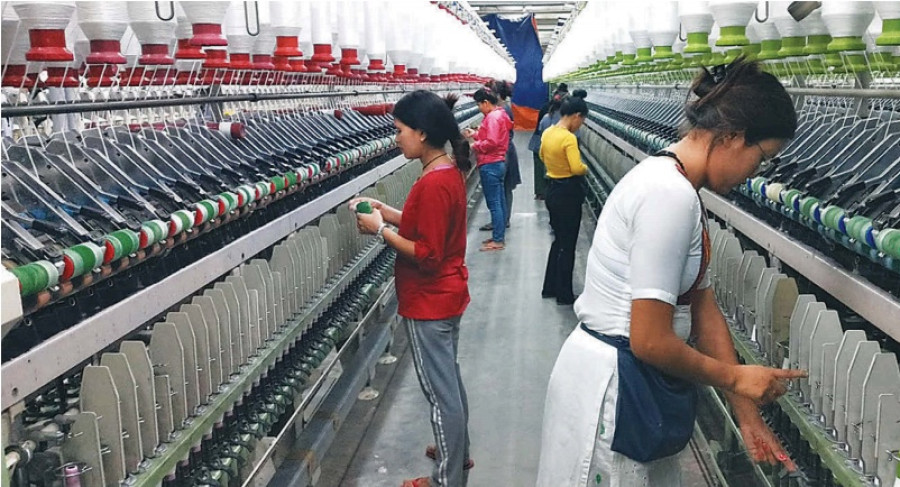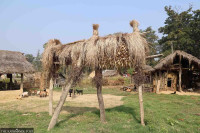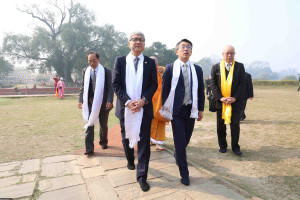Lumbini Province
Factories in Bhairahawa switch to hiring women as high male employee turnover bites productivity
With Nepali men going to work overseas, Indian workers take a big share of the labour market. As women workers are more sincere, there are signs that may change in the near future.
Madhav Dhungana
Until a few months back, Juna BK of Hadhade, Gulmi was a homemaker managing her household and looking after her child with the money her husband sent from Malaysia.
But now the 25-year-old earns more than Rs24,000 per month working at Jagdamba Spinning Mills in Bhairahawa. Her husband, on the other hand, has returned after losing his job due to the Covid-19 pandemic.
“I work at the mill during the day shift and my husband takes care of our child. He works during the night shift and then I take care of the child,” said BK.
The couple’s combined income is more than what the husband was earning abroad.
It is not just women like BK who had been a homemaker that are working at the yarn factory.
Durga Basyal of Motipur in Butwal Sub-metropolitan City, Rupandehi is an undergraduate student in the third year of her degree in Education but is working at the same factory.
“I decided to work to help my family financially,” said Basyal. "I also wanted to be a skilled worker."
While women are taking home cash income, factories are benefitting too.
With Nepali men opting to go abroad to work for better pay, factories like Jagdamba Spinning Mills in Bhairahawa, which has turned into an industrial powerhouse from a sleepy town in less than a decade, had been hiring Indian workers. But now, women workers have become an alternative.
Nepali male workers were a problem because they would leave for greener employment pastures. Employee turnover was high.
“Many male workers, after learning skills for months, abruptly quit and most of them leave for India or other foreign labour markets as they are paid higher there,” said Chiranjeevi Rayamajhi, managing director of Jagdamba Spinning Mills.
Jagdamba Synthetics, another factory in the Lumbini Industrial Corridor, has been training and providing jobs for workers. But because of high employee turnover, there is always a shortage of workers, not only in this factory but others as well.
In the last 14 years, Jagdamba Synthetics claims to have produced 15,000 skilled workers. But, according to the company, only about 500 workers are available, although it needs 800. It said a three-month training of each worker costs at least Rs45,000.
"No matter how much we train people and make them efficient, there is always a shortage of workers,” said Ratan Acharya, manager of Jagdamba Synthetics.
But factories are breathing easier as far as finding qualified employees is concerned since they started hiring women workers.
“We have accorded priority to female workers as women work [more] responsibly and with sensitivity compared to men,” said Rayamajhi. “Since we started hiring women, we are not facing employee turnover like before.”
Jagdamba Spinning Mill, which earlier had an average of 700 all-men workforce, now employs 130 women mostly from neighbouring Palpa, Gulmi, Arghakhanchi and Kapilvastu districts besides Rupandehi. But there are workers even from as far as Bajura in the west and Udayapur in the east.
Twenty-one-year-old Juna Kumari Rokaya of Bajura in Sudurpaschim Province has been getting trained at the factory for a month now.
“I don’t have anyone in my family,” said Rokaya, who has completed her high school education. “I heard that mills in Bhairahawa have been hiring women and I came here.”
More than 85 percent of the women working in the spinning industry are literate.
The factory produces yarn used for making men's clothing and is exported mainly to Turkey and India. It produces 30 tonnes of yarn a day. With demands for its product high, the industry operates 24/7.
Managers are now thinking of having an all-women day shift.
“We are also thinking of operating the entire day shift by women workers after seeing the positive changes in the industry in the last two months,” said Rayamajhi. “We need an additional 350 women workers to run the day shift.”
Jagdamba Synthetics also plans to hire more women.
“We have a plan to give priority to women workers like the spinning industry did,” said Acharya. "We are planning to start with 60 to 70 women workers on a trial basis."
According to the proprietors of industrial enterprises, Indian workers still occupy a big share of the labour market in the domestic industry. But that may change in the near future.
“Women arrive at work on time. They work full time,” said Rayamajhi. “They work with care as a result of which breakage of equipment and machines is at a minimum. There has been a change in the security, discipline and cleanliness in the factory as well."
Men on the other hand, according to managers of factories, are frequently absent and take a day off even if there is a small festival.
To attract more women, the factory is building a hostel within the premises.
“Hostels are being built in the industrial premises to accommodate women workers,” he said. “Women who are unable to commute daily to work already have an option of renting a room inside the factory premises. Some of them are even living with their families.”
According to a 2018 World Bank report, there were 3.8 million wage jobs in Nepal, while another 2.8 million Nepalis were employed in other countries.
Nepal Jobs Diagnostic indicates that most wage jobs are going to men. Altogether, men took up over two-thirds of the new wage jobs added to the economy since 2008.
“Although most women in Nepal work, the majority are unpaid. Nepal remains a highly rural economy where subsistence farming is the main economic activity for women,” said the report.
The Lumbini Industrial Corridor, which houses 26 factories, including cement, synthetics, spinning, steel, paper, plywood and food grains, employs about 5,000 daily workers directly and indirectly.
In addition, there are around five dozen factories in the Bhairahawa-Parasi and Bhairahawa-Butwal industrial corridor which requires thousands of skilled workers.
If, like Jagdamba Spinning Mills and Jagdamba Synthetics, more factories hire Nepali women, the benefit will go beyond just providing employment, according to factory managers.
The wages earned by women workers go directly to the family and there are little chances of the money being misused, Rayamajhi said.
Men’s income, on the other hand, does not all go to their families.
“Male workers spend their salaries unnecessarily,” said Bidur Dhungana, general secretary of the Western Cement Producers' Association in Rupandehi.
According to the World Bank report, women using their productive capacity to feed their families, while important, generates no income for them, under-utilising their human capital and leaving them economically isolated.
“As a result, Nepal’s economy is losing out on much of the production potential of women,” said the 2018 report.




 9.83°C Kathmandu
9.83°C Kathmandu















